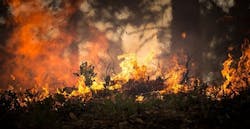Drinking Water Threatened After Fires
On Oct. 8, 2017, the Tubbs Fire engulfed most of the Fountaingrove neighborhood in Santa Rosa, Calif. Resident Serene Buhrz water had an overwhelming chemical smell in her tap water, after the event.
“It was so strong you felt like you couldn’t light a match,” said Gerald Buhrz to NBC News.
Buhrz said called the city water department and got the the agency to send someone to testing the water, according to NBC News.
Plastic water pipes had melted as the houses burned. According to NBC News, the pipes released a carcinogenic chemical called benzene into the neighborhood water system.
According to NBC News, at least 65% of the public water supply in the Western U.S. comes from fire-prone areas. The fires like the Tubb Fire can expose drinking water for millions of people to the risk of contamination by toxic chemicals and parasites. The experts are concerned the new scale of wildfires could cause damage to public water supply that is not immediately apparent.
"Lots of structures, vehicles, and man-made materials were involved in the Camp and Carr fires and there isn't a lot of information on how the environment is affected when these materials burn," said Clint Snyder, assistant executive officer of California's Central Valley Water Board, to NBC News.
The concern is prompting more intensive water testing programs following wildfires and spurring utility companies to invest in wildfire mitigation projects across the West, according to NBC News.
Fires kill healthy treat roots in addition to releasing toxins into the water supply. Without the roots, contaminating sediment and ash are flushed by rain into the reservoirs, rivers and lakes that supply cities with drinkable water.
The U.S. Geological Survey published a study that predicted wildfires could double the amount of sediment in a third of the largest by 2050, according to NBC News. In some areas, sediment could increase 1,000%, potentially carrying parasites and harmful metals and chemicals with it.
Bacteria and parasite contamination, rather than chemical contamination, are the main worries in the wake of the Camp Fire, according to the representatives at the California State Water Resources.
